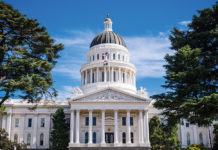Bamboozled, hoodwinked and screwed. We, the voters of California, are being set up for a monumental miscarriage of democracy when we go to vote in the Nov. 8 General Election. It’s challenging enough that the ballot contains 17 statewide propositions, the longest ballot in state history. But the real problem lies in the obscure text and the felonious pro and con arguments attached to each question.
Once again, dark money and extreme abuse of facts will challenge even the most studied of voters. It’s so bad, some might call this election rigged.
That’s too bad, because some very important questions are being asked about the death penalty, gun control, legalizing marijuana, school funding, tobacco tax, healthcare and the environment.
They should give prizes to the voters who can get the most right answers. Or, better yet, they should put a bounty on every untrue declaration, misstated fact and barefaced lie now being spread in specious campaign literature.
All the deceit and voter miseducation has already begun with TV and radio ads. Important issues like gun safety and paying for tobacco-related illnesses are being hijacked by greedy special interests.
For example, Prop. 63 would outlaw possession of large-capacity ammunition magazines, among other tightened gun control requirements. A major faction of the gun lobby calls this “hippie fascist legislation designed to torture gun-owning citizens.”
Prop. 63 is being opposed by such groups as the Coalition for More Civil Liberties, Jews Can Shoot and the Pink Pistols. Calling Prop. 63 “Gunmageddon” will not get us to any right answers about gun tragedies and rightful protections of gun ownership.
Prop. 56 would increase the state tax on a pack of cigarettes by $2, up from the current 87 cents, one of the lowest tobacco taxes in the country. The tobacco industry is attacking this tax increase by claiming Prop. 56 “cheats schools out of $600 million in taxes each year.” Is that poor math or poor honesty?
Big Tobacco radio ads also claim the new tobacco tax will not help pave roads, solve the drought or fight crime. Yes, but the new tax would contribute to expanded health education in schools and fund anti-smoking efforts. It’s very early, but tobacco companies R.J. Reynolds and Philip Morris already have spent $36 million for their smokescreen campaign. In 2012, they spent $46 million and successfully confused voters to vote against Prop. 29, a one dollar per pack tax increase.
Whatever one thinks about California’s voter-direct ballot initiative laws, there is no chance for real democracy when greedy corporations can clog the airwaves and scramble voters’ brains with millions in paid lies, deceits and criminal intent.
We can only imagine what whacky arguments await us over Prop. 64, the measure that would decriminalize recreational marijuana for adults 21 and over. Billions of dollars of future pot sales and control of a whole new industry is at stake here. If you think Big Tobacco is big, what do you think Big Cannabis will look like?
Originally California’s experiment in direct democracy was a way for citizens to propose laws and constitutional amendments without the support of the governor or the legislature. Ironically, the very first citizen initiative passed in the year 1911 was a genuine populist rebellion against the dark money and deceptive powers of the railroad and banking barons.
It’s been several elections now that corporate and special interests have taken ownership of what was once the “citizens’ ballot.”
This year voters may never find their way to them, but Props. 53, 54 and 59 contain such populist actions as denouncing the Supreme Court’s disastrous Citizens United ruling, curtailment of secret midnight legislation and a prohibition of non-voter approved bonds in excess of $2 billion.
At this point, listing more recommendations about the Nov. 8 California ballot would only confuse everyone with the actual facts. And how democratic would that be?
— Rollie Atkinson
53.7
F
Healdsburg
April 7, 2025







